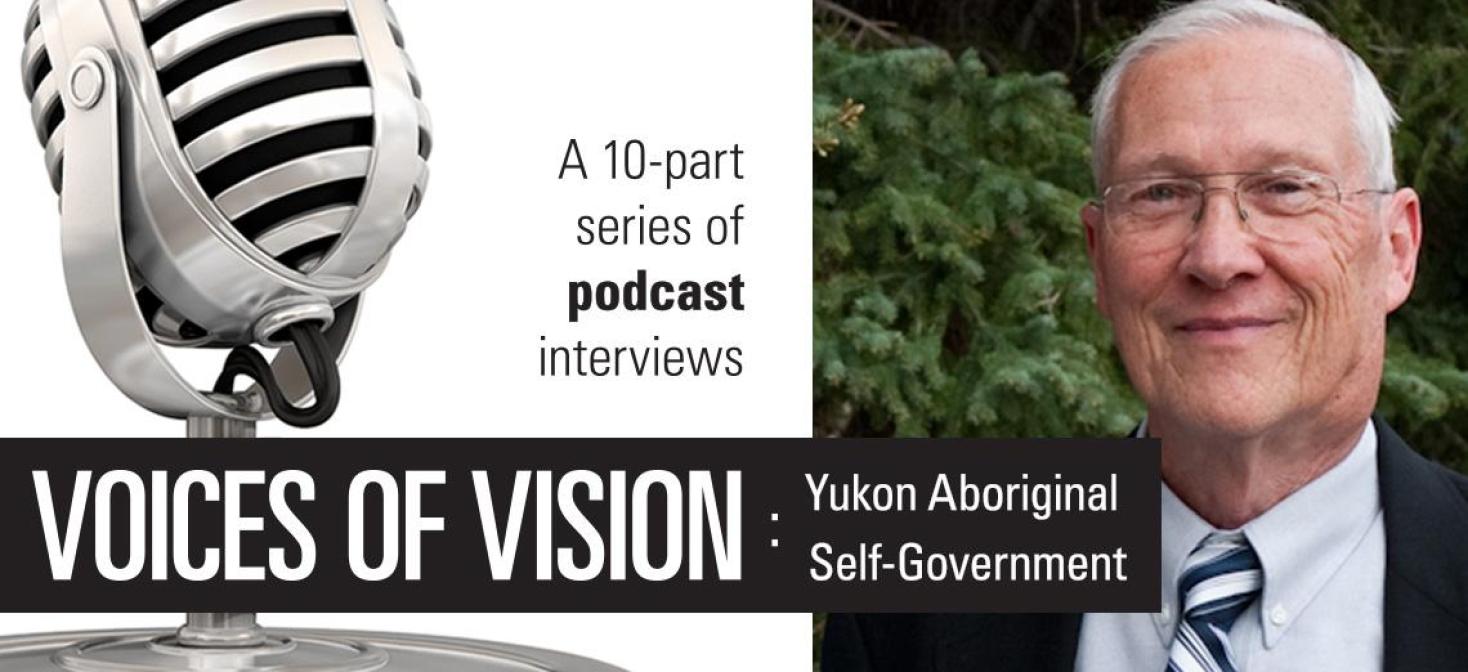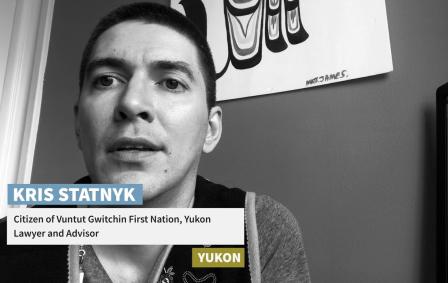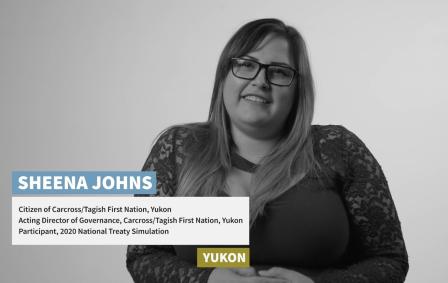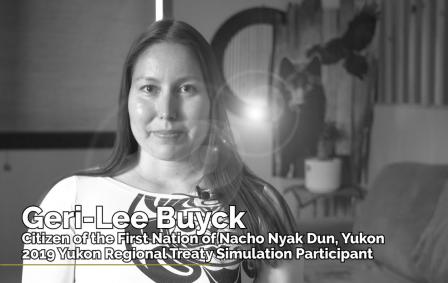Voices of Vision: An interview with Hal Mehaffey

Hal Mehaffey founded Mehaffey Consulting in 1992 after eight years as the Band Manager of the First Nation of Nacho Nyak Dun in Mayo, Yukon. Hal specializes in the negotiation of land claim and Self-Government Agreements, implementation plans and financial transfer agreements. He represented the First Nation of Nacho Nyak Dun in their negotiations and, in 1995, the First Nation went on to become one of the first four in the Yukon to put its Final and Self-Government Agreement into effect. Since then, Hal has negotiated for other First Nations including the Selkirk First Nation, the Little Salmon/Carmacks First Nation and the Tlicho Government in the Northwest Territories.
Transcription
00:00:00
MEAGAN PERRY (VOICE OVER): Hal Mehaffey is originally from Philadelphia but he moved to the Yukon to manage a Christian community farm back in the early '70s. By the time he'd left the Yukon more than 20 years later he was well known for the work he'd done supporting Yukon's self-governing First Nations. This interview is part of a series on self-government and land claims implementation in the Yukon. As I interviewed people for the series Mehaffey's name kept popping up. Turns out he got involved in self-government and land claims implementation in 1984 when he started work as Band manager for the First Nation of Nacho Nyak Dun in Mayo, Yukon. Robert Hager is former Chief of the First Nation of Nacho Nyak Dun and he told this story about how he met Mehaffey.
ROBERT HAGER: What a man, you know? When I first met Hal Mehaffey he was in Dawson. He was selling fish strip – dried fish. I thought, “Oh my. That guy looks poor. I better buy some fish strip from him.” So one other thing I didn't know Hal was really high educated man. He was ahead of us all the time – into policy and all that stuff, you know?
MEAGAN PERRY (VOICE OVER): Mehaffey was instrumental in working to ease the transition for First Nations from working within the regulations of Canada's Indian Act to taking control of their own governments. Here's John Burdek, former Chairperson for the Ta'an Kwach'an Council.
JOHN BURDEK: With Ta'an we were going through the ratification process so lots of work and a bit challenge. And Friday – you know, Friday you're an Indian Act Band and you have your vote, and Monday you're self-governing, so everybody is in there, happy, slapping each other on the back. And you sit down and about an hour later you go, “Holy smokes,” you know? “Where do we go from here?” So it's a huge challenge for a government. So fortunately there had been a lot of First Nations that had been self-governing for quite a while so we just started calling and contacting folks and, you know, one of the people we contacted was Hal Mehaffey up with Nacho Nyak Dun. And wow, he really saved us a lot of work.
MEAGAN PERRY: And if you could say something to Hal Mehaffey about your process, what would you tell him?
JOHN BURDEK: I would say, “Oh, thanks very much, Hal. You really saved us with Ta'an and got us started in a really good direction.”
MEAGAN PERRY (VOICE OVER): Mehaffey worked with 12 of the 14 First Nations in the Yukon during his time in the territory. He also played a role in developing the Umbrella Final Agreement or UFA. That's the document on which all modern-day self-government agreements in the Yukon are based. As we were putting together this series it was the Council of Yukon First Nations, also known as CYFN, who nominated him as an interviewee. Mehaffey makes his home in Vancouver now. I'm Meagan Perry, and in January of 2011 I called him up to talk about self-government, land claims, and history of the Yukon.
MEAGAN PERRY: So tell me about how you became involved in working towards self-government and land claims agreements and the way the agreements are put into practice, what we call implementation.
00:02:57
HAL MEHAFFEY: I started working for the First Nation in 1984. I was a Band manager. The land claim negotiations were going on at that time and so I saw how things might start to affect the First Nation. The way the agreements were put into practice, each First Nation had to look at the agreement and decide what their priorities were. You couldn't do everything at once so you had to assess your priorities, decide what you wanted to start on. Nearly all the First Nations started off with law and policy development, and then they started to develop these relations with both Canada and the Yukon and to build up their capacity within the First Nation itself to really put these agreements into place.
MEAGAN PERRY: And those are complicated documents and lengthy negotiations. What was it that sparked your interest?
HAL MEHAFFEY: The main thing I think, when I was a Band manager I could see how things were working. I could see how things had a chance to improve and that there was a chance to develop these things and to make the changes that would make things quite a lot better and more effective.
MEAGAN PERRY: Right, so you could see that self-government agreements would make management easier.
HAL MEHAFFEY: Yeah, well I'm not sure it would make it easier but it would make it better. So yeah, there was a lot of room for improvement in the way things were, and as the Band manager I could see that pretty clearly.
MEAGAN PERRY: Right. And so when you were given the chance to work on the self-government agreements, what were your feelings? Were you excited?
00:04:42
HAL MEHAFFEY: Yeah, I thought it was a real opportunity to move things along and to develop these government relationships, particularly when we were doing the implementation plan negotiations and these other negotiations. It was really an opportunity to help things get better.
MEAGAN PERRY: And now achieving self-government is a process that requires long-term commitments and participation from everyone involved – all levels of government. What did you hear over the years you spent working with First Nations across the Yukon? What was that like for those various First Nations that you worked for?
HAL MEHAFFEY: Well I think that the main thing that you heard starting off was the real vision that the Elders had for how the government should be, how the government should be run, what the relationship should be with the other governments. And just then the dedication and the determination of the Chief and Councils and the other people that were supporting that over the long term. And that process was extremely long and slow and hard, and it took a tremendous amount of dedication and holding to that vision that was put in front of the First Nations by their Elders.
MEAGAN PERRY: It sounds challenging.
HAL MEHAFFEY: Very challenging, yes. It took a long time just to get the agreements in place.
MEAGAN PERRY: And how does it feel to look back on all those years you worked to develop self-government in the Yukon? What do you think about when you remember that time?
HAL MEHAFFEY: Well the main thing I think about when I remember that are the people because, as I said, I started off in '84 and there were people, there were Elders there that had a vision that – there used to be one of the Elders would come in while I just started and sit down in the office and tell me stories, not for entertainment but to get points across about how things were going to be. And at this point down the road now I see some of the grandchildren of these people actually putting these things into place, and again as I think about it, think of all the meetings with the people with the First Nation Council and the CYFN Caucus and the negotiations that we went through, and there were just relationships established among these people. I really just admire them for their persistence and their determination – and also good relationship with the government people. It really did take working together and I think there was generally pretty well good will on the part of the Yukon and the federal government to try to put these things in place within the limits and constraints they had.
MEAGAN PERRY: Was there ever a time in the course of your work that you felt that self-government had made a breakthrough and when you could see that self-government was having a positive effect on the lives of Yukoners?
00:07:53
HAL MEHAFFEY: I can't think of any real specific items on that so far as things like culture, political things, economic development. It's just very positive. When that happens it's just very positive for everybody in the Yukon. It's got to be positive when you're improving the life of about 25 per cent of your people.
MEAGAN PERRY: And sometimes, you know, it's difficult for younger people to recognize the changes that self-government has brought to their day-to-day life. Can you think of a concrete example of day-to-day benefits of self-government for people who might not recognize that?
HAL MEHAFFEY: Well there's a couple areas that is possible. One, nearly all the First Nations when they set up their constitutions and their new governments established a youth council position and made it a permanent position. And so the goal there was to have – to allow the youth to have a word in what the policies and procedures and how things were run, and also at the same time to educate them about the government, how it works. And so, as I say, they'd each have a youth councillor, which is good, and also the agreements provide a much better opportunity to support education and training for young people.
MEAGAN PERRY: You worked with many of the Yukon's First Nation over the years. How did those self-government and land claims priorities vary from one First Nation to the next? Did you notice great differences or were the First Nations more unified in their point of view?
HAL MEHAFFEY: They were really pretty unified. They were unified in terms of their general goals and their goal of having their culture retained and recognized and their government recognized. But there were probably a couple of factors that varied First Nation to First Nation. One – and it wasn't really in the goals but it was maybe in the means to implement the goals – geographic location makes a big difference. If you have an isolated – really isolated location like Old Crow or some of the more just rural communities, some of the focus would be more on resource development and opportunities as opposed to, say, the ones maybe closer to Whitehorse that might have more immediate business and economic development opportunities that way.
The other thing that made some difference is the size of the First Nation because the very small First Nations have a capacity problem. They just don't have, sometimes, enough people to go around to cover everything and they've got to look for ways of cooperation or they maybe have to put some things off which perhaps larger First Nations can address initially because they have a bigger capacity. So it's really more in the means of implementing the agreement rather than in the goals and the vision for the agreements.
MEAGAN PERRY: And the Yukon First Nation land claims and self-government agreements – not to mention the Umbrella Final Agreement – those are lengthy, complicated documents. How do you explain them in simple terms to people who aren't familiar with them?
00:11:24
HAL MEHAFFEY: Actually at one point I kind of developed a chart, which of course we can't do over the phone, but it related the agreements directly to three major areas. One is resource management. One is development of governmental relationships. And one is program management and delivery. They can negotiate for their priorities on these things so – it's hard to explain beyond that. It is complicated.
MEAGAN PERRY: Yes. [laughs]
HAL MEHAFFEY: But without the chart it's hard to do.
MEAGAN PERRY: The self-government agreements are also unique in Canada and worldwide, I think, and implementing them takes time. Do you have any predictions about how governments are going to overcome the challenges that come along with building something new?
HAL MEHAFFEY: Well, I thought a bit about that and as I mentioned, you know, doing this land claims negotiations and so on, there was tremendous amount of vision and dedication on the part of these Elders and these Chiefs and the Councillors. Some of these people have passed away now, and if you look now it seems to me that there is more – there are young, dynamic Chief and Councils and they're in a transition period now trying to put this thing into effect and to try to work with the territorial government and Canada for a practical implementation of these things. And so both the First Nation and the other governments are kind of still on a learning curve and it takes time to educate the government, both the First Nation and the other governments, on how these things are going to work.
And so what I see is this is transition right now, and I think there is going to be a third generation. It's going to take a third generation for full implementation of these things. But the thing that's really going to carry this all through is still I see that same persistence that I saw in the Elders and Chiefs and Councils that were negotiating the agreement and these people now that are kind of in this transition phase and I think that's going to carry through to this additional generation. It's a slow process. It just doesn't – I mean this is, whatever, 15 years or whatever now, and it's going to take a while still to put this into place. But I think as I say I was at the meeting in October in Whitehorse and I heard the same vision, the same dedication on the part of this new governing First Nations as I heard from the old one, so I think that's going to carry them through.
MEAGAN PERRY: What is it like for you to be part of that history?
HAL MEHAFFEY: Well I'm just – I'm very happy that I was in a place where I could take part in that. It was a real learning experience, as I said. You know, the relationships with the people that were developed there were just so close. We spent so many hours and hours and hours together working on these things. I'm just happy that I could do it.
MEAGAN PERRY: OK. Thanks for talking to me today.
HAL MEHAFFEY: Thank you.
MEAGAN PERRY (VOICE OVER): That was Hal Mehaffey. He spoke to me in January of 2011 about Yukon land claims and self-government. This series of podcasts is intended to deepen public understanding of land claims and self-government agreements in the Yukon, and the opinions and ideas expressed in this interview represent the opinions and ideas of the interviewee alone. This series of podcasts was produced by the Implementation Working Group, a cooperation between Council of Yukon First Nations, Government of Yukon, Government of Canada, and Self-Governing Yukon First Nations.


